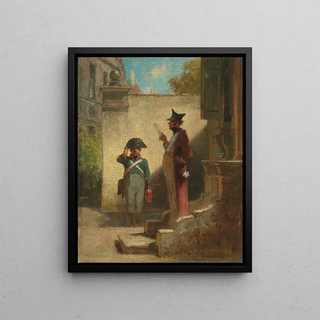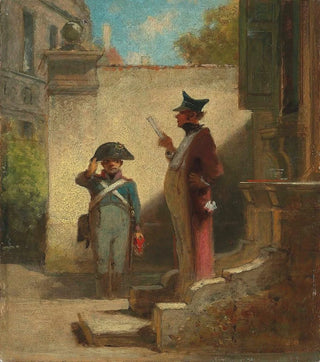Painting The Commander - Carl Spitzweg | Art print


View from behind

Frame (optional)
In the fascinating universe of art history, certain works stand out for their ability to capture the viewer's imagination. "The Commander - Carl Spitzweg" is one of these creations that, through its narrative depth and refined aesthetic, invites an exploration of themes such as solitude, daydreaming, and human nature. This piece, emblematic of the 19th century, evokes a suspended moment in time, where the central character appears lost in thought, a book in hand, facing a landscape that unfolds before him. The scene, both intimate and universal, resonates with gentle melancholy, allowing the viewer to immerse themselves in the protagonist's inner world.
Style and uniqueness of the work
Carl Spitzweg's work is characterized by a romantic style, imbued with delicacy and subtlety. The mastery of details, the palette of soft colors, and the harmony of forms give "The Commander" a peaceful and contemplative atmosphere. Spitzweg excels in depicting characters, capturing their emotions with a precision that seems to transcend mere painting. The choice of natural elements, such as majestic trees and a cloudy sky, plays a crucial role in the composition, emphasizing the connection between man and nature. This piece does not merely depict a scene; it tells a story, that of a man seeking meaning in a often tumultuous world.
The artist and his influence
Carl Spitzweg, an emblematic figure of 19th-century German painting, knew how to mark his era with his unique vision and keen sense of observation. Born in Munich, he developed within a rich artistic context, influenced by Romanticism and Realism. His works, often populated by solitary characters, testify to a particular sensitivity towards the human condition. Spitzweg captured the essence of his time, while standing out with his distinctive style. His influence endures today, inspiring many contemporary artists who seek to explore themes of introspection and melancholy. "The Commander" is a perfect example of this artistic quest, offering a window into the inner concerns of a man,

Matte finish

View from behind

Frame (optional)
In the fascinating universe of art history, certain works stand out for their ability to capture the viewer's imagination. "The Commander - Carl Spitzweg" is one of these creations that, through its narrative depth and refined aesthetic, invites an exploration of themes such as solitude, daydreaming, and human nature. This piece, emblematic of the 19th century, evokes a suspended moment in time, where the central character appears lost in thought, a book in hand, facing a landscape that unfolds before him. The scene, both intimate and universal, resonates with gentle melancholy, allowing the viewer to immerse themselves in the protagonist's inner world.
Style and uniqueness of the work
Carl Spitzweg's work is characterized by a romantic style, imbued with delicacy and subtlety. The mastery of details, the palette of soft colors, and the harmony of forms give "The Commander" a peaceful and contemplative atmosphere. Spitzweg excels in depicting characters, capturing their emotions with a precision that seems to transcend mere painting. The choice of natural elements, such as majestic trees and a cloudy sky, plays a crucial role in the composition, emphasizing the connection between man and nature. This piece does not merely depict a scene; it tells a story, that of a man seeking meaning in a often tumultuous world.
The artist and his influence
Carl Spitzweg, an emblematic figure of 19th-century German painting, knew how to mark his era with his unique vision and keen sense of observation. Born in Munich, he developed within a rich artistic context, influenced by Romanticism and Realism. His works, often populated by solitary characters, testify to a particular sensitivity towards the human condition. Spitzweg captured the essence of his time, while standing out with his distinctive style. His influence endures today, inspiring many contemporary artists who seek to explore themes of introspection and melancholy. "The Commander" is a perfect example of this artistic quest, offering a window into the inner concerns of a man,
12,34 €






